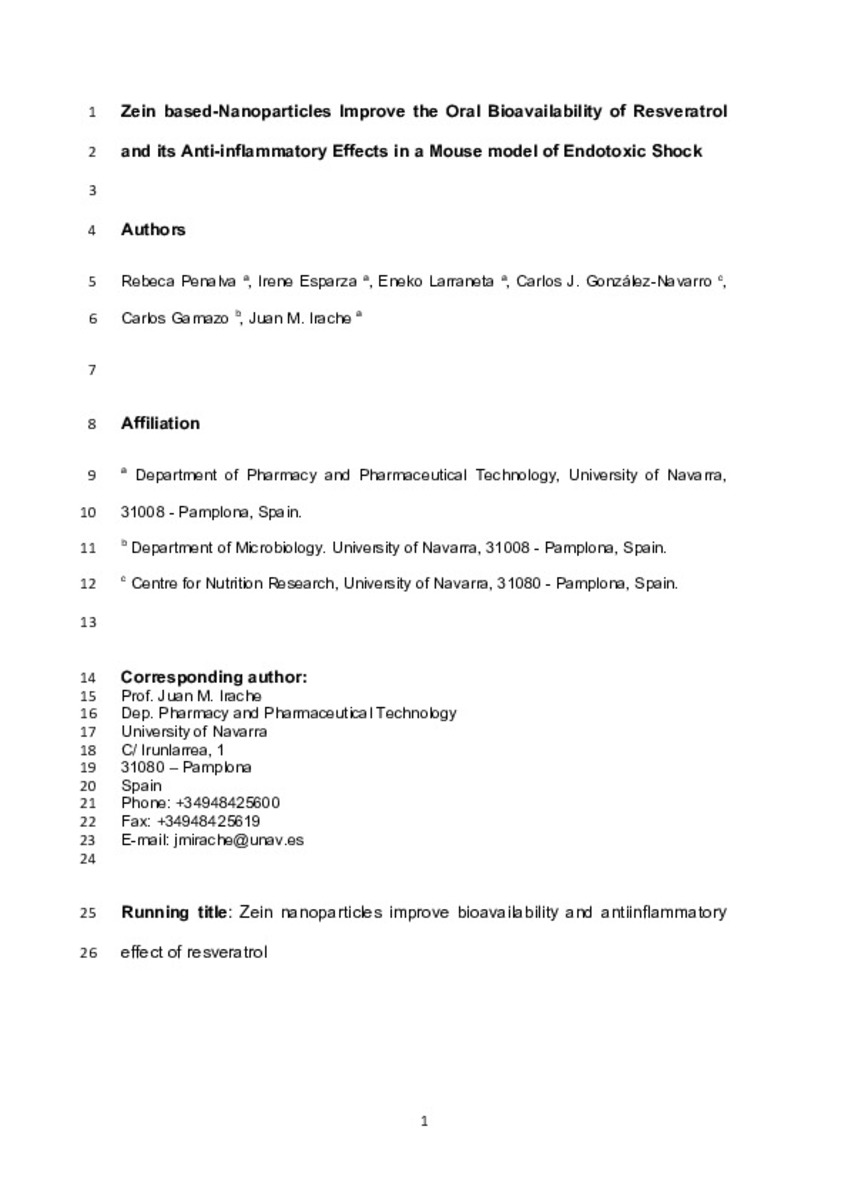Full metadata record
| DC Field | Value | Language |
|---|---|---|
| dc.creator | Peñalva, R. (Rebeca) | - |
| dc.creator | Esparza, I. (Irene) | - |
| dc.creator | Larrañeta, E. (Eneko) | - |
| dc.creator | Gonzalez-Navarro, C.J. (Carlos Javier) | - |
| dc.creator | Gamazo, C. (Carlos) | - |
| dc.creator | Irache, J.M. (Juan Manuel) | - |
| dc.date.accessioned | 2016-03-03T13:00:24Z | - |
| dc.date.available | 2016-03-03T13:00:24Z | - |
| dc.date.issued | 2015 | - |
| dc.identifier.citation | Peñalva R, Esparza I, Larrañeta E, González-Navarro C, Gamazo C, Irache JM. Zein based-nanoparticles improve the oral bioavailability of resveratrol and its anti-inflammatory effects in a mouse model of endotoxic shock. J Agric Food Chem. 2015;63(23):5603-5611 | es_ES |
| dc.identifier.issn | 0021-8561 | - |
| dc.identifier.uri | https://hdl.handle.net/10171/40129 | - |
| dc.description.abstract | Resveratrol offers pleiotropic health beneficial effects including its reported capability to inhibit lipopolysaccharide (LPS) induced cytokine production. The aim of this work was to prepare, characterize and evaluate a resveratrol nanoparticulate formulation based on zein. For this purpose the oral bioavailability of the encapsulated polyphenol as well as its anti-inflammatory effect in a mouse model of endotoxic shock were studied. Resveratrol-loaded nanoparticles displayed sizes around 300 nm with a negative zeta potential (- 51 mV) and a polyphenol loading close to 80 μg/mg. In vitro, the release of resveratrol from the nanoparticles was found to be pH-independent and adjusted well to the Peppas-Salin kinetic model, suggesting a mechanism based on the combination between diffusion and erosion of the nanoparticle matrix. Pharmacokinetic studies demonstrated that zein-based nanoparticles provided high and prolonged plasma levels of the polyphenol for at least 48 h. The oral bioavailability of resveratrol when administered in these nanoparticles increased up to 50% (20-fold higher than for the control solution of the polyphenol). Furthermore, nanoparticles administered daily for 7 days at 15 mg/kg, were able to diminish the endotoxic symptoms induced in mouse by the ip administration of LPS (i.e. hypothermia, piloerection and stillness). In addition, serum TNF-α levels were slightly lower (about 15%) of those observed for the control. | es_ES |
| dc.description.sponsorship | Regional Government of Navarra (Alimentos funcionales, Euroinnova call) and the Spanish Ministry of Science and Innovation and Gobierno de Navarra (ADICAP; ref. IPT-2011-1717-900000) | es_ES |
| dc.language.iso | eng | es_ES |
| dc.publisher | American Chemical Society | es_ES |
| dc.relation | the Spanish Ministry of Science and Innovation | - |
| dc.relation | Regional Government of Navarra (Alimentos funcionales, Euroinnova call) | - |
| dc.relation | Gobierno de Navarra (ADICAP; ref. IPT-2011-1717-900000) | - |
| dc.rights | info:eu-repo/semantics/openAccess | * |
| dc.subject | Resveratrol | es_ES |
| dc.subject | Zein | es_ES |
| dc.subject | Nanoparticles | es_ES |
| dc.subject | Bioavailability | es_ES |
| dc.subject | Anti-inflammatory | es_ES |
| dc.subject | Materias Investigacion::Farmacia::Farmacia y farmacología | es_ES |
| dc.subject | Materias Investigacion::Farmacia::Química farmacéutica | es_ES |
| dc.title | Zein based-nanoparticles improve the oral bioavailability of resveratrol and its anti-inflammatory effects in a mouse model of endotoxic shock | es_ES |
| dc.title.alternative | Zein nanoparticles improve bioavailability and antiinflammatory effect of resveratrol | es_ES |
| dc.type | info:eu-repo/semantics/article | es_ES |
| dc.identifier.doi | http://dx.doi.org/10.1021/jf505694e | es_ES |
Files in This Item:
Statistics and impact
Items in Dadun are protected by copyright, with all rights reserved, unless otherwise indicated.






